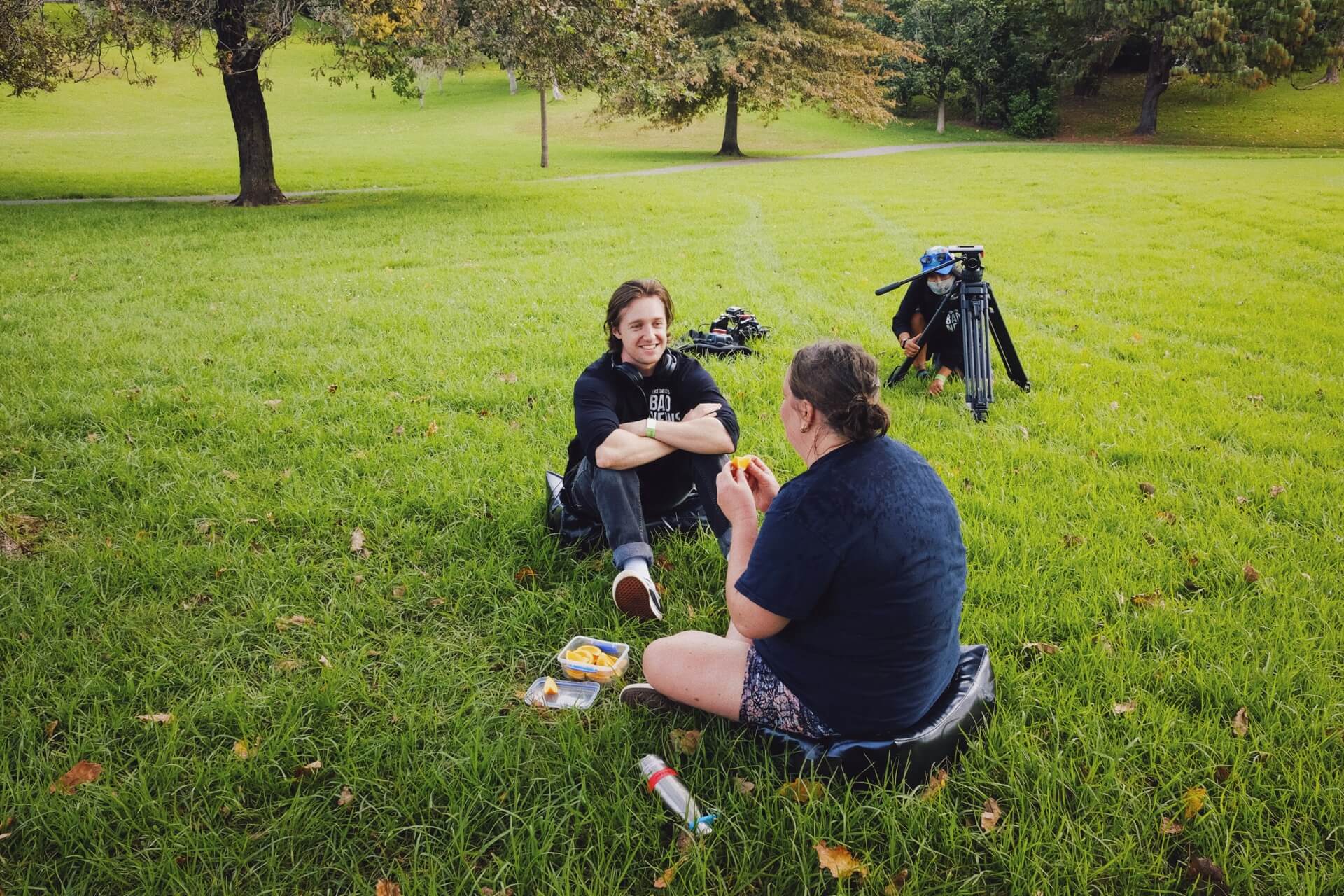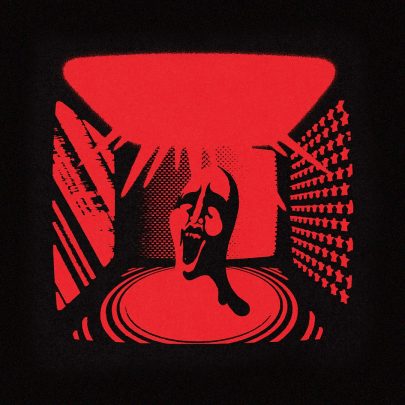Apr 23, 2023 Film & TV
“The more compassionate you get, the less funny you are,” Alice Snedden says over a glitchy Zoom call, reflecting on the third (and likely last) season of Alice Snedden’s Bad News, the current events webseries she makes with director and co-creator Leon Wadham. Which is not to say that the new season is not funny — it definitely is — but that it is more compassionate and nuanced, both to the topics covered but also to the show’s interview subjects.
Bad News caught attention in 2018 with two moments in its first series on TVNZ — one with Don Brash ostensibly espousing white supremacy; another with Snedden appearing to smoke a joint in Aotea Square to see how long it would take a white middle-class-looking woman to get noticed by the authorities (quite a while apparently). The series was filled with such moments — gotcha interviews and reporting stunts — done not out of headline-grabbing cynicism, but earnest moral outrage. And it worked. The show immediately presented a fresh, local take on the Daily Show-influenced political comedy that had been sorely missing from mainstream media outlets.
The new series, streaming now on The Spinoff, largely shies away from such moments. Over six episodes that cover wealth inequality, the politics of fat, the disability worker exclusion scheme, eating meat, prison reform and sexism in New Zealand Rugby, Snedden comes across less as a gatecrashing comedian hoping to trick people in authority into exposing their true, devilish selves; and more as a self-questioning (and in many instances self-implicated) seeker of fairness and justice. Where it was once common for Snedden to be sitting across from her interview subject, holding her tongue with a smirk as she fed rope for the hanging, she is now more likely to be sitting there, noticeably uncomfortable by the implications of the information or viewpoints she’s receiving. “Fuuuuuuuuuuuuuuck,” she says often, in moral discomfort.
“Sometimes I wonder if the show has positioned itself as, like, ‘We’re gonna take down all the bad guys! Watch us catch these idiots out!’ Which is good and fun to do, but now that I’m older and have more experience in life and in shades of grey, it felt a bit disingenuous to be still presenting that as my point of view,” she says. “I still have that moral compass — I hope — it’s just broader.” But it’s not all grey areas, she says. “I don’t believe the government has done enough on wealth inequality. I don’t think they’ve taken a hard enough stance on tax, especially tax of property. I don’t think Rugby New Zealand has done a good job with its relationship to women. I don’t think it’s improved much since we first did the episode in 2018. I don’t believe that there is good enough representation of people with disabilities in Parliament. There are things that are still absolutes in my mind.”
Leon Wadham sees the shift not just in the pair’s approach, but in the way they are perceived by their subjects — especially those in positions of power. “People are also better prepared to share all sides with us,” he says. “It was easier when people didn’t know what Alice was capable of. Now people come in with a respect for what she can do.”
Snedden and Wadham are now both living in London. Wadham is acting in a lead role in The Lord of the Rings: The Rings of Power, but due to the secrecy surrounding the show, he tends not to know where he will be, photo: Andi Crown when, and for how long. Actors on the Amazon Prime show are drip-fed scripts to avoid leaking and spoilers — and playing a non-canonical character, he doesn’t even have source material to mine for clues as to his character’s longevity. “My fate is unclear,” he says resolutely. Alice is furthering her comedy career on an increasingly international stage, including writing the sitcom Starstruck with Rose Matafeo for BBC Three and HBO Max, which has received near-unanimous critical acclaim and has recently been renewed for a third season.
The two met in 2011 at the Civic Wintergarden on opening night of Auckland Theatre Company’s Calendar Girls. “I was eating a cupcake,” Wadham recalls. “You were looking for somebody else.” Later, Wadham visited Snedden’s Kingsland flat, where Snedden was lying on a mattress in the lounge recovering from back surgery. Wadham was dating Snedden’s close friend and, soon, they all bought a house together. “We didn’t become dear dear dear friends like we are now until aft er we bought a house together,” he says.
Their friendship involved each other’s work from the outset. Snedden ran through her first stand-up set with Wadham at Herne Bay Beach. “It was good stuff!” he reminds her now. (Alice went on to make her stand-up debut with her eyes closed for the entire set.) The first thing they made together was a series of videos for the now-defunct short-form video sharing platform Vine when Wadham visited Snedden in New York City, where she lived briefly. “I thought you were on to something,” he says. “I got so close to finding my voice on the internet in 2015 and then I lost it,” she responds.
When she returned to Auckland, Snedden “made” Wadham direct some sketches she’d written for her, Chris Parker and Brynley Stent. The pair wrote a series together called Friend Ship about two people living on a boat, which never saw the light of day. Then, while working as a writer on Jono and Ben — “grateful for the opportunity but not in love with the content” — Snedden started planning what would become Bad News. “I was still only a couple of years out of law school and into comedy and I felt like I was just getting stupider and I wanted to try and engage the political part of my brain that I had previously enjoyed. Also there was just stuff that annoyed me.”
She pitched the Bad News idea to TVNZ, where she’d established a relationship by presenting Little Survivor, a Survivor recap show with Matty McLean, filmed in a shipping container in the TVNZ carpark. “I made the meeting and thought it was going to be super-casual but then they had chips on the table and I was like, ‘Whoa, this is a meeting!’”
The show was commissioned in 2018 as part of a TVNZ push for original webseries, by the then-commissioner for children and digital, Amie Mills. And Wadham, who had directed a webseries at TVNZ as part of its New Blood competition, was the obvious collaborator. The pair went out with a meagre budget and a makeshift crew and shot as much as they could for a pilot episode comparing the policing and impacts of tax evasion versus benefit fraud (you’ll never guess which one causes the most societal harm and which one gets the most convictions). While they had clear ideas about the kind of show they were going to make — the episode includes Snedden taking former WINZ chief executive Christine Rankin through a drive thru and Snedden calling accountants to ask whether they could help her commit tax evasion (they seemed open to it) — Snedden credits Wadham for taking her meandering ideas, loose reporting and hours and hours of footage and finding within it what would become the format for the series. “The show actually came together with the first episode on tax evasion versus benefit fraud,” she says. “The show doesn’t exist without Leon, because he is the brain who was able to put that stuff together in the edit.”
“Alice is too kind and too generous,” Wadham says immediately. Their back-and-forth is characterised by mutual admiration and self-deprecation. “Alice’s gift is that she comes into a room — often in the first season, intentionally dressed like she just got out of bed — and then everyone underestimates her acumen. In her words, she has no idea what she’s said when that hour is over, so my job is to go through all the conversations and try and weave a thread together from this incredibly high-level conversation. I was always astonished by her ability to come in far beyond what the experts and these people connected to these issues knew themselves.”
While the new series is no less an illustration of Snedden’s ability to grasp complex ideas and situations, it is less self-assured, more self-examining, more circumspect and, in a way, more humble. Snedden points to the episode about wealth inequality — which in turn becomes about property ownership and then colonialism — as the one that caused her the most introspection. “That had the biggest impact on me in terms of, ‘Fuck, I’ve got to think through a practical way to absorb this into my life’. In truth, I haven’t got there yet.”
Wadham’s proudest moment of the series is in the episode about rugby — its place in New Zealand society and culture, and, more specifically, the way Rugby New Zealand has handled gender issues. The episode features footage from an aborted episode in the first season, which includes a confrontation related to the Chief’s ‘Mad Monday’ scandal from 2016. Rugby New Zealand has changed since that incident, Snedden is assured by CEO Mark Robinson. There have been investigations and reports. Things are changing, she’s told. But have they changed enough? If there’s one thing (other than Snedden’s self-examination) that links the episodes together it’s an exhaustion with incrementalism.
“The villain of the series is complacency and it’s my complacency as much as anyone else,” Snedden says. “And it’s the government’s complacency. It’s this feeling of ‘steady as she goes’ and that’s incredibly frustrating… It’s the product of becoming more aware of your place in the world. When we did the first season it was 2018, and a lot has changed — my awareness of my own privilege and my own complacency and complicity within this system, that is actively perpetrating the oppressive things that I’m fighting against, is no longer something I am able to avoid.”
“It’s easier to make this show if you just point the finger at what everyone else is doing, but it feels gross to us to not be accountable for what we have and what we’re doing,” says Wadham, the back-and-forth-finishing-of-each-other’s-sentences increasing in intensity.
“And it’s not going far enough to point the finger at yourself, you then actually have to make a change, which is such a nightmare,” Snedden continues.
“Exhausting!” Wadham adds.
“I’m still eating meat.”
“Same.”
–






